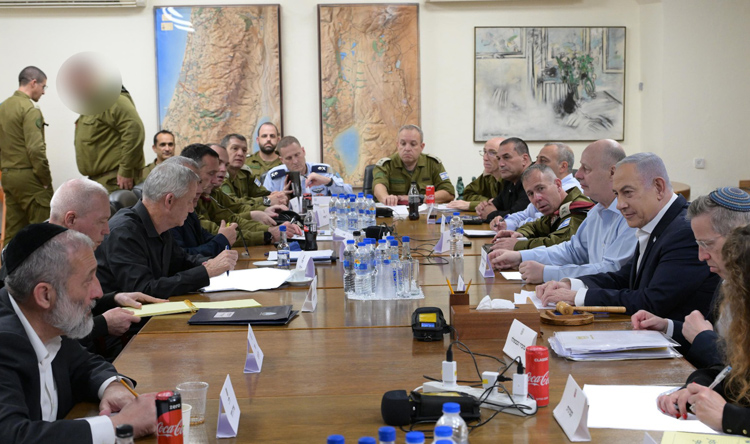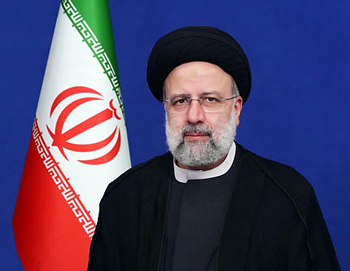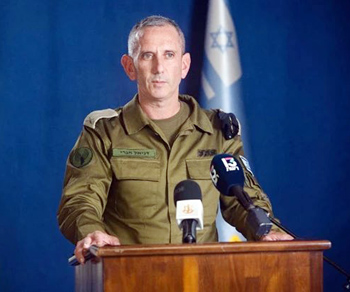INDIAN ARMED FORCES CHIEFS ON OUR RELENTLESS AND FOCUSED PUBLISHING EFFORTS

The insightful articles, inspiring narrations and analytical perspectives presented by the Editorial Team, establish an alluring connect with the reader. My compliments and best wishes to SP Guide Publications.

"Over the past 60 years, the growth of SP Guide Publications has mirrored the rising stature of Indian Navy. Its well-researched and informative magazines on Defence and Aerospace sector have served to shape an educated opinion of our military personnel, policy makers and the public alike. I wish SP's Publication team continued success, fair winds and following seas in all future endeavour!"

Since, its inception in 1964, SP Guide Publications has consistently demonstrated commitment to high-quality journalism in the aerospace and defence sectors, earning a well-deserved reputation as Asia's largest media house in this domain. I wish SP Guide Publications continued success in its pursuit of excellence.
- Prime Minister Modi Visits Punjab’s Adampur Air Base, Interacts with Airmen after Successful ‘Operation Sindoor’; Stern Message to Pakistan
- The layered Air Defence systems that worked superbly, the key element of Operation Sindoor
- Operation Sindoor | Day 2 DGMOs Briefing
- Operation Sindoor: India strikes back with Precision and Purpose
- Operation Sindoor: Resolute yet Restrained
- India’s Operation Sindoor Sends a Clear Message to Terror and the World – ‘ZERO TOLERANCE’
- Japan and India set forth a defence cooperation consultancy framework, talks on tank and jet engines
- Terrorist Attack in Pahalgam in Kashmir: Unfolding a long surgical war against PAK
- Lt General Pratik Sharma takes over Command of Indian Army's Northern Command
Middle East Braces for Escalation
Iran's direct aerial assault on Israel signals end of Shadow War and raises stakes of a broader Middle East conflict

Iran's dramatic aerial attack on Israel on April 14, 2024, follows years of proxy wars. The recent attack mark the first time Iran has launched a direct military assault on Israel.
About 350 rockets were fired at Israel on April 14 by Iran and its allies in Iraq, Syria, Yemen, and Lebanon
The world at large has called out for diplomatic talks and de-escalation in the wake of potential counter-attacks from the Israeli side. In the simmering tensions afterwards, President Joe Biden warned Prime Minister Benjamin Netanyahu that the US would not take part in a counter-offensive against Iran, an option that Netanyahu's war cabinet favours after the attack, according to officials.
300+ launches.
— Israel Defense Forces (@IDF) April 14, 2024
99% interception rate.
This is the breakdown of Iran's attack last night: pic.twitter.com/aRPvxSutW2
But the clash looked like it could further sharpen global divisions. On one side, even after six months of Hamas' attack, the ongoing conflict between Israel and Hamas is turning into a possibility of broader regional war, this new salvo of attack from Iran will keep teetering the Middle East on edge.
The Iran-Israel conflict grew under the "shadow war", fought by Iran's proxies like Hamas and Hezbollah. The direct attacks by Iran now heralded the end of the shadow war and the beginning of the near-war scenario, bringing large-scale instability in the Middle East.
How and why did the attack take place?
About 350 rockets were fired at Israel overnight to Sunday by Iran and its allies in Iraq, Syria, Yemen, and Lebanon. Led by the Iranian Revolutionary Guard, it fired about 170 drones, more than 30 cruise missiles and more than 120 ballistic missiles. However, according to the Israeli military and the White House, '99 per cent' of the projectiles were intercepted by Israel's aerial defence systems along with the help United States, Jordan and Britain who also took part in intercepting the attack.
Israelis' reality in the last hours: pic.twitter.com/VXeHM8WqJi
— Israel Defense Forces (@IDF) April 14, 2024
According to initial reports, any damage from the Iranian attack appeared to be limited. The Israel Defense Forces (IDF) said that the majority of missiles and drones attacked were intercepted. "A small number of hits were identified, including at an IDF base in southern Israel, where minor damage was caused to infrastructure," the IDF said.
What triggered the attack by Iran was the airstrike by Israel on the Iranian Consulate building in Damascus, killing of at least seven high-ranking Commanders of the Iranian military gathered in the Consulate

What triggered the attack by Iran was the airstrike by Israel on the Iranian Consulate building in Damascus, killing of at least seven high-ranking Commanders of the Iranian military gathered in the Consulate, including Mohammed Reza Zahedi, a Top Commander in Iran's elite Revolutionary Guards (IRGC), and Senior Commander Mohammad Hadi Haji Rahimi.
The airstrike killed Zahedi, a former Commander of the IRGC's ground forces, and air force, and the deputy Commander of its operations. Zahedi who was among the highest-ranking officials who became the target after another IRGC General Qassem Soleimani's assassination in Baghdad in 2020.
While Iran Supreme Leader Ayatollah Ali Khamenei called for retaliation and punishing Israel, President Ebrahim Raisi said it would "not go unanswered". The Iran-backed Lebanese militant group Hezbollah which is already geared against the Gaza seizure, has echoed the Iranian statements said, the strike would be met with "punishment and revenge."
What is next?
Israel was set to take its first steps toward a ground offensive in Rafah this week, but has delayed those plans as it mulls a response to Iran's attack, two Israeli sources have told CNN. Despite strong international pressure to abandon an all-out ground offensive, Israeli Prime Minister Benjamin Netanyahu has long emphasised the significance of entering Rafah to destroy Hamas's surviving battalions. However, a military reaction that runs the risk of intensifying the conflict with Iran would divert resources and focus from Gaza to the military.
The Israeli military declared that, in response to Iran's unprecedented attack, Israel had, for the first time, created a 'coalition' with the United States, Britain, France, and other allies
The Islamic Republic is using its 'inherent right to self-defence' in reaction to what it views as Israeli aggression, according to Iran's UN representative. Iran claims that the attack on Israel was a necessary and appropriate retaliation for the widely attributed Israeli act that destroyed its embassy building in Damascus.

The Israeli military declared that, in response to Iran's unprecedented attack, Israel had, for the first time, created a 'coalition' with the United States, Britain, France, and other allies. "We stopped Iran's onslaught together..."In a televised statement, IDF spokesperson Rear Admiral Daniel Hagari stated that this was the first time a coalition of this kind collaborated to counter the threat posed by Iran and its proxies in the Middle East.
However, China has taken a detour. In a post on X that was later deleted, China's government mouthpiece the Global Times initially blamed the confrontation on a 'failure' of international organisations to 'condemn Israel's attacks on Iranian diplomatic facilities,' singling out the United Nations Security Council. The Chinese statement backed Iran said, "Night's barrage was in retaliation for Israeli 'crimes', including an April 1 strike on its Consulate in Damascus. The Israeli government has neither confirmed nor denied its role in that strike, which killed several Iranian military officials."
The US typically provides diplomatic cover for Israel at the UN. Many in the world body have criticised and voted against Israel in recent months over its devastating invasion of Gaza, which has killed over 33,000 Palestinians, according to local authorities. The invasion was in retaliation for the deadly infiltration of Israeli territory by the Palestinian militant group Hamas on October 7, 2023 which killed about 1,200 people.
Experts have pointed out that the unfolding crisis in the Middle East could distract Washington from the Ukraine war and will probably dominate the attention of the US administration.
Iran's mission to the United Nations said in a statement afterwards that "the matter can be deemed concluded." But it was unclear whether Israel would agree, having previously vowed to respond to any direct attack in kind. Tensions between the two countries have been simmering for years over Iran's nuclear programme, which Israel considers an existential threat but Tehran insists is for peaceful purposes.
The experts have pointed out that the unfolding crisis in the Middle East could distract Washington from the Ukraine war and rising tensions with China over Taiwan and the South China Sea. This situation will probably dominate the attention of the US administration.
Aaron David Miller, a Senior fellow at Carnegie and Former State Department analyst, has further outlined the outcome which certainly points out the continuity in the conflict due to the scale and audacity of the Iranian attacks. 'Israel scored a huge tactical security/political success in defending against Iranian missiles and partnering w/ US and Sunnis. The question now is how to turn that into a strategic opportunity without courting regional war. No Israeli government can accept Iran's strike as the new normal,' Miller said.
At the same time, the UN Security Council held an emergency meeting as the UN Secretary-General Antonio Guterres said in a statement, "I strongly condemn the serious escalation represented by the large-scale attack launched on Israel by the Islamic Republic of Iran this evening. I call for an immediate cessation of these hostilities." 'I am deeply alarmed about the very real danger of a devastating regionwide escalation,' he warned.
Manish Kumar Jha is a Consulting & Contributing Editor for SP's Aviation, SP's Land Forces and SP's Naval Forces and a security expert. He writes on national security, military technology, strategic affairs & policies.





